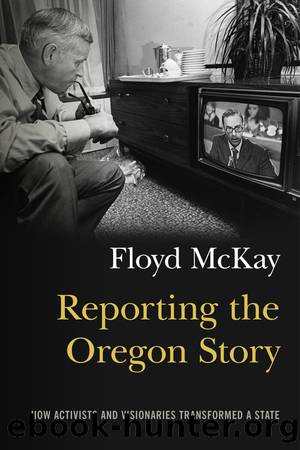Reporting the Oregon Story by McKay Floyd J.;

Author:McKay, Floyd J.; [McKay, Floyd J.]
Language: eng
Format: epub
Publisher: Oregon State University Press
Stafford Hansell is a blunt and respected state legislator with a degree in economics. His computerized hog ranch is across the interstate freeway from the ammunition igloos. When the Armyâs plan was announced, he called his hands together and told them he had lived with the weapons of mass destruction for two decades and wasnât worried about a little more nerve gas. The workers agreed. âThis is not a college community,â Hansell observed. âWe havenât argued the morality of the thing.â
R. P. âJoeâ Smith did argue the morality, from an unlikely position as district attorney of Umatilla County. Smith, a lean and articulate descendent of the Joseph Smith who founded the Mormon Church, was a bit of an anomaly in the rural countyâa liberal Democrat, he had lived there only two years. He became the local lightning rod for the debate. âWhat you have down there (Hermiston) is a mini military-industrial complex,â he told me, referring to chemicals stored at the depot as âgenocidal weapons.â
It was a precursor, I later realized, of any number of situations in which a small community would opt for good jobs despite an environmental or livability threat, while urbanites with more diverse economic opportunities would see a larger picture. Logging, coastal development, nuclear power, and field burning were some of the big-picture issues that looked quite different in Hermiston or Halsey than they did in Portland or Eugene.
As the Vietnam War generated anger and even violence nationwide, the nerve gas standoff brought into focus statesâ rights, and an increasingly unpopular war machine; ultimately it also brought national attention to Oregonâs governor and the stateâs reputation for independence. Governor McCall wrote to President Nixon and Vice President Agnew to no avail. He lined up all but one of the Oregon-Washington congressional delegation to oppose the shipment. The holdout was critical, however; the hawkish Washington Democratic senator Henry âScoopâ Jackson had enormous influence with Nixon. When Jackson finally turned against the shipments in May 1970 they were abandoned. Jackson was credited for the victory, but McCall had kept the battle alive.
It took six months for the battle to play out, during which Tom emerged as a stronger and stronger advocate of Oregon citizens. In the midst of the battle, I moved to the unfamiliar world of television news, my home for the next seventeen years. My very first commentary, on April 13, 1970, was on the nerve gas issue. It was a somewhat convoluted argumentâtoo complex for television, as I would learnâand it was based on the low-profile Third Amendment to the US Constitution (you know, the one prohibiting the quartering of soldiers in civilian homes). I argued:
Download
This site does not store any files on its server. We only index and link to content provided by other sites. Please contact the content providers to delete copyright contents if any and email us, we'll remove relevant links or contents immediately.
| Publishing & Books | Research |
| Writing |
Asking the Right Questions: A Guide to Critical Thinking by M. Neil Browne & Stuart M. Keeley(5545)
Autoboyography by Christina Lauren(5144)
Eat That Frog! by Brian Tracy(4340)
Dialogue by Robert McKee(4256)
Sticky Fingers by Joe Hagan(4049)
Journeys Out of the Body by Robert Monroe(3520)
Annapurna by Maurice Herzog(3385)
Full Circle by Michael Palin(3337)
Elements of Style 2017 by Richard De A'Morelli(3268)
Schaum's Quick Guide to Writing Great Short Stories by Margaret Lucke(3262)
The Art of Dramatic Writing: Its Basis in the Creative Interpretation of Human Motives by Egri Lajos(2929)
Why I Write by George Orwell(2840)
The Diviners by Libba Bray(2831)
In Patagonia by Bruce Chatwin(2819)
The Mental Game of Writing: How to Overcome Obstacles, Stay Creative and Productive, and Free Your Mind for Success by James Scott Bell(2806)
The Fight by Norman Mailer(2775)
Atlas Obscura by Joshua Foer(2746)
Venice by Jan Morris(2488)
The Elements of Style by William Strunk and E. B. White(2405)
